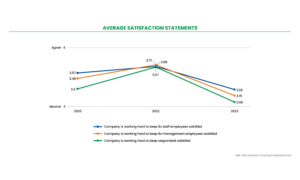By David Alford, Vice President of Bristol Associates, Inc.
Bristol Associates, Inc., a boutique executive recruiting firm, recently released the 3rd Annual Food and Beverage Manufacturing Survey Results. The survey serves as a resource for employers to attract, motivate, and retain their talent, while providing professionals a space to share their experiences and opinions about their workplace and the industry as a whole. This year’s questionnaire, which was conducted in May 2023, consisted of queries related to employee satisfaction, well-being, work-life balance, and career priorities.
A decline in satisfaction and optimism within the industry
Employed respondents were asked to rate their level of agreement for a series of satisfaction statements on a scale of 1 to 5 (1 indicates Strongly Disagree and 5 indicates Strongly Agree). The results show employee satisfaction has decreased across the board; average ratings are lower now than when the survey took place during the height of the pandemic (see graph). Additionally, 76% of professionals are optimistic about the future of their careers, a decrease of 12% since 2022.
Other statistics from employed professionals:
- 4 out of 10 believe their company is working hard to keep them satisfied
- 42% feel supported in their career growth at their current organization (a 15% decrease from 2022)
- 53% have received adequate training to perform their duties (a 9% decrease from 2022)
Employee well-being and work-life balance
Respondents who are employed and self-employed/consultants were prompted with questions related to their well-being and work-life balance.
Full-time professionals report working an average of 50 hours a week. While 79% of respondents work overtime – defined as working more than 8 hours in a day – at least once per week, a quarter regularly work overtime 5-7 days a week.
Vice president-level professionals express having the most overtime, stress, and workload compared to all other job levels, including C-suite/president-level respondents. Here are statistics from vice president-level respondents:
- 92% work overtime at least one day per week, which is 14% more than C-suite/president-level professionals
- 66% express being somewhat or very stressed in relation to work, while 56% of C-suite/president-level respondents share the same sentiment
- 36% report having too much workload, which is 8% higher than C-suite/president-level workers
Nearly 9 out of 10 food and beverage employees check their work while on vacation – specified in the survey as 5 or more consecutive days of paid time off (see pie chart). A little over a quarter have not taken a vacation in over a year (see pie chart).
When asked to select all of the reasons that affect their decision to take PTO, 47% of professionals chose the amount of work that they have to make up when they return. However, it is worth noting that 37% of respondents do not have any applicable reasons that affect their decision to take PTO.
Company culture outranks compensation in career priorities
Respondents were also asked to pick their highest priority when choosing a new employer. For the first time since the survey’s debut, compensation is no longer the top career priority. This year, company culture received the highest percentage of votes, while compensation tied with work-life balance for second-highest priority (see graph). Paid time off received zero votes.
When analyzing by job level, the largest percentage of director-level and higher respondents voted company culture as their top priority, while the highest percentage of manager-level and below professionals chose work-life balance.
In order to attract new hires, many organizations are finding it necessary to increase wages. However, with the decline of optimism and employee satisfaction in the industry compared to last year, food and beverage companies will also need to prioritize cultivating company culture and employee wellness to retain their current employees in today’s market.
These are just a few of the findings from the survey. Click here to view the full report that covers hiring challenges, industry concerns, and job search preferences.

